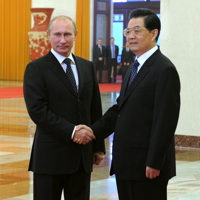China-Russia relations took another step forward during Prime Minister Vladimir Putin's visit to Beijing last week. With the Arab Spring throwing the two governments into an unexpected alliance at the United Nations this year, the visit marked the continuation of attempts to build a deeper and less volatile bilateral relationship. The two sides signed off on trade deals worth $7 billion, demonstrating a tangible effort to move beyond energy-based economic ties, while Putin suggested a greater focus on China for the Kremlin's foreign policy after the recent period of rapprochement with the U.S. This suggests that, although mistrust and suspicion will remain potentially disruptive, the trend toward greater cooperation should continue.
That was hardly a certainty when the Russian delegation arrived in China for the two-day visit. A recent Stockholm International Peace Research Institute (SIPRI) report (.pdf) authored by Linda Jakobson and others concluded that "while relations will remain close at the diplomatic level, the two cornerstones of the partnership over the past two decades -- military and energy cooperation -- are crumbling. As a result, Russia's significance to China will continue to diminish." The news agenda prior to the visit -- dominated by the two sides' stalled negotiations on a $1 billion gas supply mega-deal and the recent revelation that Russia's Federal Security Service (FSS) is detaining a Chinese national on suspicion of attempting to procure classified Russian weapons technology -- seemed to bear that finding out.
Both sides, however, were keen to stress the broader nature of recent deals, which include technology-transfer and research and development cooperation. Chinese President Hu Jintao welcomed Putin as "an old friend of the Chinese people," while the latter painted energy cooperation as little more than a peripheral issue in relations.

